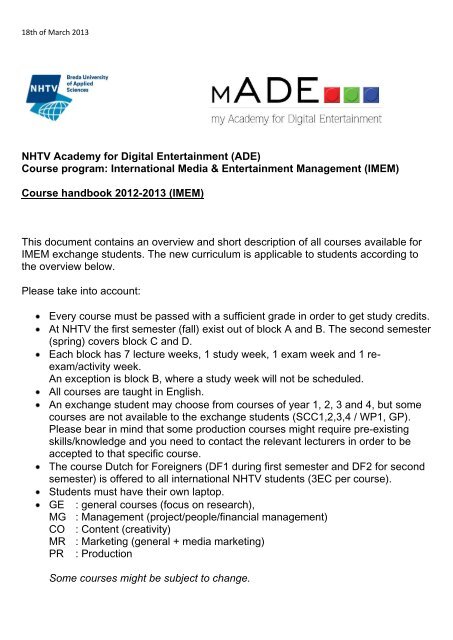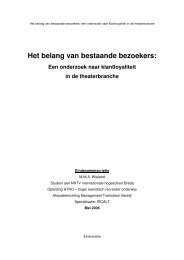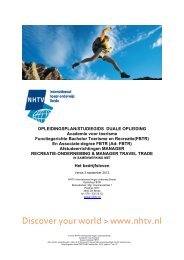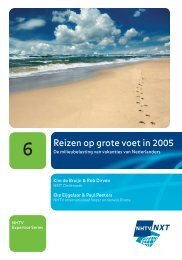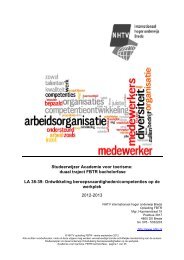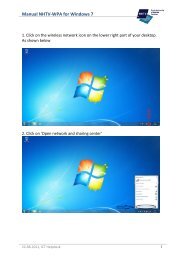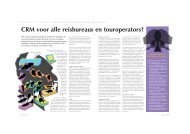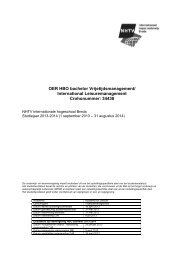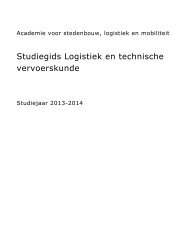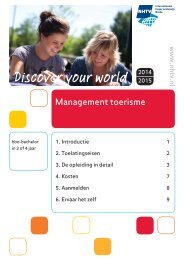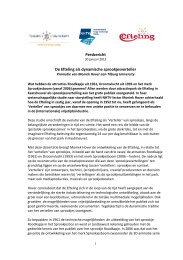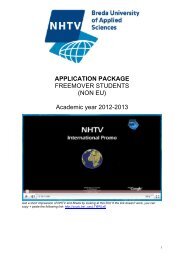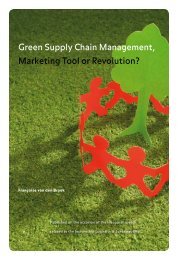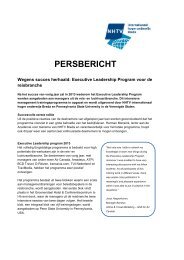Course handbook - Nhtv
Course handbook - Nhtv
Course handbook - Nhtv
Create successful ePaper yourself
Turn your PDF publications into a flip-book with our unique Google optimized e-Paper software.
18th of March 2013<br />
NHTV Academy for Digital Entertainment (ADE)<br />
<strong>Course</strong> program: International Media & Entertainment Management (IMEM)<br />
<strong>Course</strong> <strong>handbook</strong> 2012-2013 (IMEM)<br />
This document contains an overview and short description of all courses available for<br />
IMEM exchange students. The new curriculum is applicable to students according to<br />
the overview below.<br />
Please take into account:<br />
Every course must be passed with a sufficient grade in order to get study credits.<br />
At NHTV the first semester (fall) exist out of block A and B. The second semester<br />
(spring) covers block C and D.<br />
Each block has 7 lecture weeks, 1 study week, 1 exam week and 1 reexam/activity<br />
week.<br />
An exception is block B, where a study week will not be scheduled.<br />
All courses are taught in English.<br />
An exchange student may choose from courses of year 1, 2, 3 and 4, but some<br />
courses are not available to the exchange students (SCC1,2,3,4 / WP1, GP).<br />
Please bear in mind that some production courses might require pre-existing<br />
skills/knowledge and you need to contact the relevant lecturers in order to be<br />
accepted to that specific course.<br />
The course Dutch for Foreigners (DF1 during first semester and DF2 for second<br />
semester) is offered to all international NHTV students (3EC per course).<br />
Students must have their own laptop.<br />
GE : general courses (focus on research),<br />
MG : Management (project/people/financial management)<br />
CO : Content (creativity)<br />
MR : Marketing (general + media marketing)<br />
PR : Production<br />
Some courses might be subject to change.
Overview all courses 2012/ 2013<br />
IMEM Year 1<br />
Osiris course code <strong>Course</strong> name<br />
A B C D Year<br />
FME1.GE1-02 Introduction to Media & Entertainment 3<br />
FME1.GE2-01 Presentation Skills 2<br />
FME1.GE3-01 English Writing 2<br />
FME1.GE4-01 Introduction to Research 2<br />
FME1.GE5-01 Conducting Research 3<br />
FME1.MG1-01 Introduction to Management 2<br />
FME1.MG2-01 Project Management 3<br />
FME1.MG3-01 People Management 3<br />
FME1.MG4-01 Financial Management 1 3<br />
FME1.MG5-01 Financial Management 2 3<br />
FME1.CO1-04 Fundamentals of Story Telling 3<br />
FME1.CO2-04 Media Literacy 2<br />
FME1.CO3-04 Script Writing 2<br />
FME1.CO4-04 Concept Creation 2<br />
FME1.CO5-01 Media Narrativity 2<br />
FME1.MR1-01 Introduction to Marketing 1 3<br />
FME1.MR2-01 Introduction to Marketing 2 3<br />
FME1.PR1-01 Image Editing 3<br />
FME1.PR2-01 Camera and Audio 3<br />
FME1.PR3-01 Production 3<br />
FME1.PH1-05 Production House 1 2<br />
FME1.PH2-05 Production House 2 2<br />
FME1.PH3-05 Production House 3 2<br />
FME1.SC1-01 Study Coaching 1 not available for exchange students 2<br />
IMEM Year 2<br />
Osiris course code <strong>Course</strong> name<br />
A B C D Year<br />
FME2.GE6-01 Media Ethics 2<br />
FME2.GE7-01 Critical Reading & Writing 2<br />
FME2.GE8-01 Media Psychology 2<br />
FME2.GE9-01 Persuasive Writing 2<br />
FME2.GE10-01 Quantative Research 3<br />
FME2.GE11-01 Media Legislation 3<br />
FME2.GE12-01 Qualitative Research 2<br />
FME2.MR3-04 Marketing Plan 3<br />
FME2.MR4-01 Marketing Communication 3<br />
FME2.MR5-01 Media Planning 3<br />
FME2.CO6-01 Non Fiction Storytelling 3<br />
FME2.MG6-01 Financial Management 3 3<br />
FME2.MG7-01 Business Strategy 2<br />
FME2.PH4-01 Production House 4 2<br />
2
FME2.PH5-04 Production House 5 2<br />
FME2.PH6-04 Production House 6 2<br />
FME2.PH7-04 Production House 7 2<br />
FME2.PR4-01 Introduction to Web Design & Development 3<br />
FME2.PR5-01 Web Design & Development 3<br />
FME2.PR6-01 Media Production 11<br />
FME2.SC2-01 Study Coaching 2 not available for exchange students 2<br />
IMEM Year 3<br />
Osiris course code <strong>Course</strong> name<br />
A B C D Year<br />
FME3.WPS-02 Work Placement not available for exchange students 30<br />
FME3.MG8-01 Management Skills 1 2<br />
FME3.MG9-01 Business Models 5<br />
FME3.MG10-01 Management Skills 2 2<br />
FME3.PH8-01 Production House 8 3<br />
FME3.PH9-03 Production House 9 3<br />
FME3.GE13-01 Research Methodology 5<br />
FME3.CO7-01 Content Analysis 5<br />
FME3.CO8-01 Transmedia Storytelling 5<br />
FME3.MR6-01 Sales & Account Management 5<br />
FME3.MR7-01 Direct / Database Marketing 5<br />
FME3.PR7-01 Media Production Practice 5<br />
FME3.PR8-01 Mobile Application Development 5<br />
IMEM Year 4<br />
Osiris course code <strong>Course</strong> name<br />
A B C D Year<br />
FME4.GE14-01 Advanced Research Methodology 5<br />
FME4.PH10-01 Production House 10 6<br />
FME4.SC3-01 Portfolio Preparation not available for exchange students 2<br />
FME4.SC4-02 Placement Preparation not available for exchange students 2<br />
FME4.GRP-02 Graduation Project not available for exchange students 30<br />
FME4.CO9-01 Creativity 5<br />
FME4.CO10-01 Ideas for Brands 5<br />
FME4.MR8-01 Online Marketing 5<br />
FME4.MR9-01 Branded Entertainment Marketing 5<br />
FME4.PR9-01 Interactivity 5<br />
FME4.PR10-01 International Producing 5<br />
3
<strong>Course</strong> Track Summary Descriptions<br />
GE = General courses<br />
GE1 – Introduction to Media & Entertainment<br />
This course will provide an overview of the various media industries (Film, Television,<br />
Music, Games, Print, Internet, etc.) with particular emphasis on current trends and<br />
issues, and the economic forces that continually drive change across every facet. By<br />
examining where the industry has been and where it is today, we will give you a<br />
foundation for reflection and for anticipating where industry trends are leading long<br />
term.<br />
GE2 – Presentation Skills<br />
Presentations are a popular way to communicate an idea, your skills or a company to<br />
an audience. You may need to present a concept, a finished product or even your<br />
skills for a job application within the industry.<br />
This course will prepare you for all other course where the delivery of a presentation is<br />
required.<br />
GE3 – English Writing<br />
The language of communication and instruction at the ADE is English. The overall<br />
English Communication Skills Programme is designed to provide ample learning<br />
opportunities in critical reading, writing, and speaking. Writing and speaking are<br />
powerful ways to achieve social awareness, self-confidence, and professional<br />
competences. They are regarded as a practical means of reflecting the development of<br />
meta-cognitive and linguistic skills in the context of a future career in digital<br />
entertainment management. This course provides the basic knowledge and language<br />
skills for ADE students to develop their ability to communicate accurately and<br />
effectively in the international field of the Media and Entertainment industry in view of<br />
their future careers.<br />
GE4 – Introduction to Research<br />
Research allows you to make informed decisions and to take informed action. This<br />
course is the foundation to your understanding of research and how it is conducted.<br />
Virtually all of your courses, from marketing to content to management, will require<br />
research. For instance, in marketing, research is used in order to gain insight into<br />
target groups and to discover current or future trends.<br />
In this course you will learn how to develop research questions and hypothesis,<br />
develop surveys and write an introduction and method section for a research paper.<br />
GE5 – Conducting Research<br />
In this course students will learn to create a data entry tool in LimeSurvey and export<br />
the data results to Statistical Package for the Social Sciences software (SPSS). The<br />
course further focuses on SPSS and statistics. Topics include uni-variable analysis<br />
(measures of central tendency, measures of dispersion) and bi-variable analysis<br />
4
(correlation measures, T-test) and the creation of tables and graphs. The goal of the<br />
course is that students are able to report their results to an audience.<br />
GE6 – Media Ethics<br />
<strong>Course</strong> focusses on the evaluation of ethical issues in the field of media, and on<br />
making substantiated decisions, taking different stakeholder’s interests into account. A<br />
number of relevant cases which were in the media will be discussed along the way.<br />
The course connects in a general sense to communicative courses in the program and<br />
to courses in which discussion and/or the presentation of material is assessed.<br />
GE7 – Critical Reading & Writing<br />
The language of communication and instruction at the ADE is English. Writing and<br />
speaking are, furthermore, acknowledged at ADE as powerful ways to achieve social<br />
awareness, self-confidence, and professional competences. They are also regarded as<br />
a practical means of reflecting the development of meta-cognitive and linguistic skills in<br />
the context of a future career in digital entertainment management.<br />
However, English is for most ADE students a foreign or second language, rather than<br />
a native tongue. In order to meet the requirements of the international professional and<br />
academic world, students need to have the opportunity to develop their English<br />
language skills —both, in writing and public speaking.<br />
The overall English Communication Skills Programme is designed to provide ample<br />
learning opportunities in critical reading, writing, and speaking. This course provides<br />
extended knowledge and language skills for ADE students to develop their ability to<br />
communicate accurately and effectively in the international field of the Media and<br />
Entertainment industry.<br />
GE8 – Media Psychology<br />
In today’s experience economy, in which most physiological needs are fulfilled, people<br />
are looking for emotions and affection. And that’s what media and entertainment have<br />
to offer: emotions as pure entertainment or as a commercial tool to attract people and<br />
engage them to a product or brand. Whether in the future students will work in the<br />
production area, making those appealing media products, or in the marketing area,<br />
trying to engage people to your brand, fact is that ‘touching people’ will be their job in<br />
order to create meaningful media experiences for them. But how can we move people<br />
if we don’t know anything about the reasons why people have these emotions? Why<br />
do people react in the way they do? This course in elementary media psychology will<br />
provide basic insight in how media work and how they provoke human emotions.<br />
Understanding this will make students better able to influence these processes in the<br />
future when working as media producers.<br />
GE9 – Persuasive Writing<br />
How to sell your message in writing, in a convincing and reader-focused way? That’s<br />
the challenge in this course. This is something to take into consideration when working<br />
out your marketing campaign. This talent can also be vital when pitching for a new<br />
5
assignment, to stand out from your competitors. So it directly relates to Production<br />
House assignments as well as students third and fourth year internship periods.<br />
Relation to Industry: ‘How to sell yourself and your message (in writing)’ is important<br />
from acquisition to finally marketing your product or service. Convince prospects,<br />
clients and consumers by communicating the right message in the most interesting<br />
way possible.<br />
GE10 – Quantitative Research<br />
Students execute in groups of two a small quantitative research project.<br />
During this course the following activities need to be trained:<br />
• writing a research proposal<br />
• collecting data<br />
• analysing and interpreting results<br />
• reporting a study via a research report<br />
• reporting a study via a research poster<br />
The students explain and defend the poster (and receive some feedback) in a 'poster<br />
session' at the end.<br />
Groups may choose between five research fields, introduced in a kick-off meeting<br />
(including some literature suggestions), and have to narrow down the chosen topic in<br />
their problem statement. They may choose between three main research designs/data<br />
collection methods: (1) online survey, (2) quantitative content analysis, (3) experiment<br />
(It depends on the research field which research designs and methods are applicable).<br />
In every study a program to design an electronic questionnaire or a data entry<br />
instrument (LimeSurvey) should be used and SPSS to analyse them.<br />
GE11 – Media Legislation<br />
This course explores the most common areas of law encountered in media practice:<br />
intellectual property (copyright, trademark and patent law), contract law, and laws<br />
affecting the individual (privacy, defamation and portrait rights). The issues discussed<br />
in these areas of law support and directly relate to the substance and structure of the<br />
various personnel and business transactions students have to undertake in relation to<br />
the projects in the production courses. In developing and creating content for the<br />
content course projects, students have to bear in mind the issues explored in<br />
intellectual property, privacy, defamation and portrait rights laws. Also, this course<br />
complements the topics of privacy and freedom of expression covered in Media Ethics,<br />
from a legal standpoint. Further, this course is a foundation for the production stream<br />
course International Producing in the fourth year, where more complex legal<br />
transactions affecting production will be explored.<br />
The process of creating media content touches on a range of legal aspects that a<br />
media professional needs to be aware of. As such, the course content directly<br />
addresses these legal aspects, and exposes the student to standard legal and<br />
business processes that are common in the industry.<br />
6
GE12 – Qualitative Research<br />
This course introduces the students to the epistemological underpinnings of qualitative<br />
research and furthers their knowledge of a variety of different qualitative data collection<br />
and analysis possibilities. Although this course cannot address every contemporary<br />
qualitative technique, it covers the most commonly used. Furthermore, the lecturers<br />
are committed to provide ‘hands on’ experience with these techniques in the best<br />
means to ensure effective learning.<br />
The qualitative research methods are introduced to the students through step-by-step<br />
instruction on how to conduct research and interpret research findings. Next to that, indepth<br />
discussions during the tutorials help the students to understand the cultural,<br />
historical and theoretical background of the methods and case studies drawn from<br />
published media and mass communication scholarship.<br />
The theoretical knowledge in combination with the practical experience gained in this<br />
course enables the students to design and conduct qualitative research projects in the<br />
future independently.<br />
The main topics that will be covered in the course are:<br />
- Ethics in qualitative research<br />
- Case Studies<br />
- In-depth interviews<br />
- Focus Groups<br />
- Participant Observation<br />
GE13 – Research Methodology<br />
Conducting Research (GE13) continues the research track curriculum by giving<br />
students the opportunity to put this knowledge and the acquired tools to practice.<br />
Within the course they will conduct a full qualitative or quantitative study, which will<br />
result in a proposal, report and presentation. Their process will be guided with lectures<br />
and working classes, which will refresh and extend the knowledge from year 1 and<br />
year 2. Depending on their decision to conduct either a qualitative or quantitative study<br />
they will be assigned to the corresponding working class.<br />
Relation to industry: decisions within the media industry/marketing are usually based<br />
on research data gathered through qualitative and/or quantitative systematic<br />
examination. Hence, designing, conducting, reporting and interpreting research should<br />
be part of a media professional’s skill set.<br />
GE14 – Advanced Research Methodology<br />
The main goal of the course is to implement the methodological and (media<br />
theoretical) knowledge from previous courses* into a solid research proposal. As such<br />
it is related to all previous courses. Of course it has a direct link with the other research<br />
courses:<br />
7
Relation to Industry: The course relates strongly with the Industry. The general idea is<br />
that guest lecturers from industry partners provide the students with real cases /<br />
problems that need to be translated by the students into research briefings and<br />
research proposals. In doing so it brings researchers from industry and students<br />
together. As such, the course connects research (new insights) with Industry dealing<br />
with specific areas such as (a) new media concepts and products, (b) improving<br />
existing media products (through measuring media and communication effects) and (c)<br />
media marketing.<br />
* GE4: Introduction to research, GE5: Conducting Research, GE11: Quantative<br />
Research, GE13: Qualitative Research, CO7: Content Analysis and GE13: Research<br />
Methodology<br />
CO = Content related courses<br />
CO1 – Fundamentals of Story Telling<br />
This course covers the fundamentals of concept development as well as content<br />
quality analysis and recognition on a basic level. <strong>Course</strong> contents include storytelling<br />
as a cultural backbone, story cultures and theories, semiotics and stylistic devices in<br />
storytelling.<br />
CO2 – Media Literacy<br />
Media Literacy implies understanding the meaning of media messages, focusing on<br />
the content of the message and its semiotics. It also implies proper behaviour in<br />
mediated communication, emphasizing communicative characteristics of the specific<br />
media.<br />
This course covers the concepts and range of media literacy i.e. the understanding of<br />
the specific meanings of media messages as well as the cultural standards and<br />
responsibilities that come with mediated communication.<br />
CO3 – Script Writing<br />
This course is designed to assist students in distinguishing good scripts from bad (or<br />
underdeveloped) ones, whether the purpose of the scripts is purely for the<br />
entertainment industry, or whether they are being used as marketing tools for brands.<br />
Topics include creating characters, story structure and scene breakdown.<br />
The output of this course (a branded drama script) will be used as input for the PR3<br />
course in which the best scripts will be taken into production.<br />
CO4 – Concept Creation<br />
This course covers the fundamentals of creating (branded) experiences for a specific<br />
target audience, which is the core business of the media and entertainment industry.<br />
Topics covered in the course include communicating your concept, using creativity to<br />
create concepts, adding value and understanding the target group.<br />
8
CO5 – Media Narrativity<br />
This course elaborates on the recognition of narrative concepts and of content quality<br />
standards. Topics covered are the specific narrative features pertaining to the following<br />
media platforms: film, television drama, televised entertainment, internet and online<br />
messaging.<br />
CO6 – Non Fiction Story Telling<br />
In this course, students will find and tell a human interest story in a non-fictional way.<br />
Each student has to find and prepare such a human-interest story individually and<br />
deliver a written editorial portfolio for one part of the final grade. The most promising<br />
stories and non-fiction scripts are selected to be filmed and edited in groups. The<br />
filmed feature stories have to be submitted by each group and will add the second part<br />
to the final grade per student.<br />
The tutorials will take the students through one editorial cycle from developing a<br />
human-interest story over researching and interviewing to filming and editing a feature<br />
story. Students will get to know and train on- and offline research skills, prepare and<br />
practice journalistic interview techniques and document all editorial steps in an industry<br />
relevant fashion and format. The lectures will provide students with theoretical<br />
knowledge to each step of the editorial cycle, practiced in the tutorials. They will also<br />
allow the students insights in editorial work in connection with the media and<br />
entertainment industry. The content of the lectures aims to help students gain an<br />
overview over the past, present and probable future developments in the non-fiction<br />
market and develop a motivated opinion about the use of human-interest in various<br />
media genres.<br />
In their own study time, students are expected to read articles and book chapters<br />
provided prepare assignment and actively search and research relevant background<br />
information and topic related contacts that lead to a real story as well as plan, film and<br />
edit the filmed feature from beginning to end.<br />
The main topics that will be covered in the course are:<br />
• The creation of non-fiction filmed features from concept to product<br />
• Non-fictional writing skills, TV grammar and TV language<br />
• Journalistic research, interview and storytelling skills<br />
CO7 – Content Analysis<br />
Within this course individual students in the content specialization have the possibility<br />
to explore media products or phenomena that they particularly interested in –<br />
preferably connected to the area of their desired future profession. They are expected<br />
to gather their own sources of (academic) information, perform proper literature study,<br />
analyse the media communication content of one or more products and report their<br />
findings in both a presentation as a well written essay.<br />
Content analysis within the course will relate to the humanist approach, as opposed to<br />
the behaviourist approach (Shoemaker & Reese, 1996). This means that students will<br />
9
study media content itself and identify what the chosen content says about society and<br />
the culture producing it. Which effect the content produces in society doesn’t fit within<br />
the scope of this course.<br />
Relation to Industry: Content analysis is a methodology in the social sciences for<br />
studying the content of communication. Having a more profound insight in how specific<br />
media content is constructed will be of great value when being asked to develop<br />
creative media content yourself.<br />
CO8 – Transmedia Story Telling<br />
Transmedia Storytelling is a creative content course crossing all media entertainment<br />
platforms and categories. It combines knowledge acquired in CO1, CO2, CO3, CO4<br />
and GE1 in the 1st year.<br />
It also requires developing People Management skills developed in MG3 in the 1st<br />
year and applying Media Psychology developed in the MG9 in the 2nd year.<br />
The course is also a preparation for applying learned skills the Production House in<br />
Block A of the 4th year where a cross-media brand case project will require knowing<br />
how to fully integrate creative content across several media platforms and channels.<br />
Relation to industry: both the entertainment and marketing industry is increasingly<br />
needing fully integrated cross-media content. Creating platform-specific entertainment<br />
(or advertising) content is no longer sufficient prospective managers need to know and<br />
understand the dynamics of many channels and entertainment forms and how to<br />
develop content for several channels where each of these are self-contained but are<br />
connected and consistent with an overall ‘story world’.<br />
CO9 – Creativity<br />
The course starts off with an intensive 3 day workshop, led by an expert from the<br />
professional field. In small groups students will learn to develop Big Ideas that are an<br />
answer to a client brief. By turn they will take the lead in managing their own group.<br />
These way students will be prepared for the mADE production house 4th year project<br />
in which they will manage their fellow students from other specialisations in the<br />
creative process and guide them safely through it – the desired end result being<br />
guaranteed.<br />
Besides that students will study how creativity works by studying theories on creativity<br />
and different creative techniques. Guest lecturers will give them an insight how these<br />
theories will be applied in the daily practice of creative companies.<br />
Students will also design a creative technique themselves, which they have to motivate<br />
based on the theory they studied, and test them in focus groups<br />
CO10 – Ideas for Brands<br />
In this course students will be asked to produce creative work for clients of IFB<br />
McCann, a prominent advertising agency in Amstelveen, part of the global McCanngroup.<br />
The company will provide the students with assignments from the business, on<br />
10
which the students need to deliver creative output. This will be on a weekly basis, with<br />
strict deadlines.<br />
IFB/McCann will feedback on their work and score students for the general ranking: a<br />
weekly updated chart which provides a competition element by providing insight in<br />
which students are able to deliver high quality work on a weekly basis.<br />
Students will also have to pitch their work to each other, receiving feedback from both<br />
their lecturers as their fellow students. Besides that, during tutorials some writing<br />
exercises will be done to prepare students for the weekly assignments.<br />
The course is related to first-year course Concept Creation, to Persuasive Writing in<br />
the second year and to a minor degree to the marketing courses of the first and<br />
second year.<br />
Relation to Industry: The course mimics for a big part the work of a creative team (art &<br />
copy) within a regular advertising agency: under time pressure working on creative<br />
assignments, being briefed by commercial clients who demand a high quality output.<br />
MG = Management related courses<br />
MG1 – Introduction to Management<br />
This course is a foundation course for the management stream. Students forming or<br />
working within a corporate structure need to understand how this structure works.<br />
Topics include understanding management roles and functions, the decision-making<br />
process and biases, change management, social responsibility and ethics.<br />
MG2 – Project Management<br />
This course is relevant to all courses in which students are required to use project<br />
management elements such as planning. Topics include project characteristics and<br />
lifecycle, project team roles and responsibilities, business case, quality management,<br />
planning and budgeting, risk management, agendas, meetings and progress reports,<br />
documentation and project evaluation.<br />
MG3 – People Management<br />
This course is relevant to all courses in which students are required to work within and<br />
participate as part of a group. Topics include group theory and development, diversity<br />
in organizations, conflict management, power and politics, organizational culture, the<br />
HRM cycle, motivation and leadership.<br />
MG4 – Financial Management 1<br />
This course covers, in a general way, financial statements, financial management and<br />
the business plan. Topics include elements of the business plan, corporate finance<br />
topics, capital budgeting and sources of capital and the financial structure of a<br />
business.<br />
11
MG5 – Financial Management 2<br />
This course covers the creation of value, financial statements, financial management<br />
and in particular equity, liabilities and financial statement analysis in order to control<br />
the creation of value and costs. Topics include the nature and purpose of the three<br />
major financial statements, simple financial statement analysis and underpinning<br />
accounting conventions and working capital calculations.<br />
MG6 – Financial Management 3<br />
This course is following after MG4 Financial Management 1, which was an introduction<br />
and MG5 Financial Management 2 of the first year. In the first year basic subjects such<br />
as cash flow, balance sheet were covered. Emphasis was more on definitions and<br />
understanding the subjects. In this year’s course the focus is more on the management<br />
side. This course should give you the tools and skills to manage the budget of a film<br />
production, project or your own business. Also tools are given to make a sound<br />
decision whether or not to invest in a media project, event etcetera. In the end, all<br />
ideas/projects need cash to make them happen. When financing a business a<br />
business plan should be made. Detailed information on all financial statements within<br />
financial accounting is given.<br />
The main topics that will be covered in the course are:<br />
• fixed and variable costs<br />
• cost volume profit analysis<br />
• absorption costing<br />
• direct costing<br />
• costs and decision making<br />
• cost allocation<br />
• budgets<br />
• variance analysis<br />
• financial reporting<br />
• investments<br />
MG7 – Business Strategy<br />
This course is a continuation of the Management stream of year 1. The course<br />
prepares students for their upcoming work placements by exposing them to more<br />
advanced management concepts allowing them to add value to their perspective work<br />
organizations.<br />
Relation to Industry: The advanced management concepts taught in this course relate<br />
directly to industry. Students would be expected to use skills learned from this class in<br />
day-to-day business operations, decision-making and strategy considerations.<br />
The main topics that will be covered in the course are:<br />
1. Strategy Formulation<br />
2. Organizational structures<br />
3. Vision & Mission Statement<br />
4. Negotiation<br />
5. Role Playing<br />
6. Case Studies<br />
12
MG8 - Management Skills 1<br />
This course is a course designed to inculcate an awareness within the student,<br />
regarding decision making process on management level. This automatically requires<br />
knowledge of interpersonal skills. The course relates directly to group work<br />
assignments required throughout the IMEM program. It will also introduce the student<br />
to leadership and motivational theory and concepts.<br />
To be(come) a good manager, you should learn about the business environment and<br />
the most leading facets within this environment, like organizational structures, the<br />
mission statement and strategy formulation. You will get a better understanding of<br />
these facets by analysing theories and different organizations in the media &<br />
entertainment branch.<br />
The used literature will give you more insight in your own attitude to life and<br />
possibilities to develop yourself into a more effective personality - manager. We will<br />
use the book by going through all 7 habits that – according to Stephen Covey – are<br />
crucial for leading the most effective (work) life possible.<br />
Supplemented with other indispensable managerial topics (to be discussed in the<br />
tutorials) you should, in the end, have a clear picture of the qualities you possess that<br />
make you a (possible) great or poor manager. Besides, you should understand how a<br />
company’s policy affects its outcomes, successes and work climate.<br />
Relation to Industry: Preparing students for the media & entertainment industry<br />
requires attention to all sorts of management aspects such as company structures,<br />
strategy formulation, mission and strategy implementation. Students will be given the<br />
tools to develop themselves in becoming an effective leader/ group worker.<br />
MG9 – Business Models<br />
“A business model describes the rationale of how an organization creates, delivers and<br />
captures value.”<br />
An understanding of the fundamental difference between business models can help to<br />
unravel business successes and ultimately avoid making mistakes in creating a<br />
business model from a creative concept. Designing a successful business model is an<br />
essential task in commercial success. In this sense it has an external (market<br />
perspective) and an internal (organizational perspective) and therefore this subject is<br />
an addition to marketing because of the holistic approach. In this sense a business<br />
model is a tool to understand the organization and design of the process of value<br />
creation by a firm.<br />
Business Models relates to the management and marketing courses in the first and<br />
second year. This course is a comprehension of the marketing-/production courses<br />
(Value creation of firms) and of the financial-/marketing courses (how does a firm<br />
capture value from the market).<br />
13
Relation to Industry: This course relates to the three main disciplines in the value chain<br />
of the media industry: Content creation, Production, Marketing.<br />
In the business model all aspects need to be harmonized in order to create value<br />
proposition for customers. Transfer this value proposition to target customers and<br />
capture value of the target customers<br />
MG10-Management Skills 2<br />
In this MS2 course you will be wearing the hat of the human resources manager; what<br />
does it take to really get to know your employees and to make them do whatever is<br />
best for the company? In terms of Covey the mental and social/ emotional dimensions<br />
are covered. How is talent best used and how to treat your employees? Our main<br />
focus for this course: how do you – the manager - communicate properly and<br />
effectively to your employees? Since: External Success starts with Internal Harmony.<br />
To be(come) a good manager, you should learn about the business environment and<br />
the different areas in it (Finance, Marketing & Communication, Human Resources<br />
Management). In your possible future position of manager, you will have to exert<br />
influence on your environment. In this process, communication skills are vital! Our<br />
main focus for this course: how do you – the manager - communicate properly and<br />
effectively to your employees?<br />
This course is a course designed to inculcate awareness within the student, regarding<br />
all sorts of manager - employee interviews (application, performance, assessment<br />
interview and bad news conversations). All this from a manager’s perspective. It has a<br />
close relation to student’s third and fourth year internship. It furthermore is in close<br />
relationship with their graduation report as students need to conduct surveys in which<br />
their interview techniques might be crucial for success.<br />
Relation to Industry: Preparing students for the media & entertainment industry<br />
requires attention to all sorts of management aspects. In this case we will focus on the<br />
manager - employee relationship. How to get your employees on board?<br />
Communication as a helpful tool to enlarge the company’s chances to success.<br />
MR = Marketing related courses<br />
MR1 – Introduction to Marketing 1<br />
This course is a springboard to all courses within the marketing stream and provides a<br />
sound introduction to the basic principles and techniques of marketing and introduces<br />
students to the first two elements of the “marketing mix”, product and price. Topics<br />
include marketing environment and situation analysis, strategy and tactics,<br />
segmentation, targeting, positioning, CRM and consumer behaviour.<br />
MR2 – Introduction to Marketing 2<br />
This course focuses on two of the instruments within the marketing mix called<br />
Distribution (Place) and Marketing Communication (Promotion). Topics include<br />
services marketing, theories of communication, advertising and public relations, sales<br />
14
promotions, direct marketing, personal selling, retail and an introduction to the<br />
marketing communication plan.<br />
MR3 – Marketing Plan<br />
While 1st year courses MR1 and MR2 taught you the basic principles of marketing,<br />
MR3 will take you one step further by focussing on writing a marketing plan. During<br />
this course you will apply and analyse the marketing principles learned in previous<br />
lessens and synthesise that into a marketing plan. You will also learn which role a<br />
marketing plan plays in the strategic planning of a company.<br />
The main topics that will be covered in the course are:<br />
• what is the structure of a marketing plan<br />
• designing a marketing plan for a self-selected existing product<br />
• the essentials of the strategic planning process versus the functional planning<br />
process<br />
• the characteristics of B-t-B marketing and its differences compared to B-t-C<br />
marketing<br />
MR4 – Marketing Communication<br />
This course is the follow-up of Introduction to MR1 and MR2 of the first year, and MR3<br />
Marketing Plan of the second year. Besides this, it will (partly) form the input for the<br />
course Media Planning, which will happen in block C.<br />
In one of the previous marketing courses the Marketing Mix was explained. This<br />
course will focus on one of the instruments within this mix called Promotion, or even<br />
more specifically Marketing Communication.<br />
This course will provide students with some insights into ways marketers approach<br />
their own communication activities. Beginning with some background in<br />
communication theory, the course goes into the mechanics of producing marketing<br />
communications. Through this, we’ll survey various techniques marketers have for<br />
telling their story. In sum, the course will provide students the tools to create a<br />
standard Marketing Communications Plan.<br />
Topics covered in the course:<br />
• The scope of marketing communications<br />
• Communication: interactivity and conversations<br />
• Audiences: attitudes, behaviour and decision-making<br />
• Strategies, objectives and positioning<br />
• Integration and planning<br />
• Agencies: practice, regulation and international communications<br />
• The marketing communications mix<br />
• Interactive Marketing Communications<br />
15
MR5 – Media Planning<br />
Related to all previous marketing courses, Media Planning can be considered as the<br />
end of the marketing process.<br />
Media Planning (MR5) tries to answer the question: what media do I need, to<br />
communicate the message to my target group?<br />
The main topics that will be covered in the course are:<br />
- Relation of media versus marketing and communication<br />
- Media behavior of the target group<br />
- Media strategy<br />
- Media metrics like: reach/frequency/GRP, media pricing an media budgets<br />
- The media mix<br />
- Cross media propositions<br />
In the end it all results in a media plan which also has to be evaluated.<br />
MR6 – Sales & Account management<br />
In first and second year’s courses Marketing 1 you have had a sound introduction to<br />
the basic principles of marketing and applying these techniques to the Media and<br />
Entertainment industry.<br />
In this course the knowledge is deepened on a specific area of interest, namely sales<br />
relating subjects.<br />
Relation to Industry: Account management has been developed in an attempt to<br />
counter increasing market turbulence. Suppliers and customers are seeking closer<br />
relationships to reduce their exposure to the risks posed by globalisation, economic<br />
instability and technological change.<br />
Especially in the case of major or key accounts one has to continuously go back and<br />
forward between the customer’s desires and the possibilities of the organisation. On<br />
top of that customers have different demands regarding the product-serviceinformation.<br />
This trend is even more enforced by the increased market fragmentation:<br />
each customer has own unique demands.<br />
This has radical consequences for the people responsible for accounts. Besides salesand<br />
relation management tasks, it is also expected that one can think strategically and<br />
commercially and has project management and business planning skills.<br />
MR7 – Direct / Database Marketing<br />
The general objective of this course is to provide students with thorough theoretical as<br />
well as practical knowledge on direct and database marketing, and insights into ways<br />
that marketers use databases to focus on their customers. This knowledge is of a<br />
strategic, a technical-analytical, as well as an organizational nature.<br />
16
Besides positioning direct and database marketing in the context of integrated<br />
marketing communication it will also be positioned it in a larger strategic marketing<br />
setting.<br />
The online technologies used for this purpose enable the collection of customer data<br />
and for developing one-to-one relationships with customers, which are topics<br />
addressed in this course about direct and database marketing.<br />
Relation to Industry: In their study to knowledge and skill required for marketing jobs in<br />
the 21st century, Pefanis Schlee & Harich (2010) concluded that marketing positions<br />
require more and more technical skills in terms of database analysis and CRM. This in<br />
addition to communication skills, team work, and understanding concepts like<br />
marketing plan, product management and marketing research.<br />
Practical and technical skills are becoming more important, especially in the<br />
Entertainment Industry. “DBM [Database Marketing] is important because it is at the<br />
heart of the switch made by businesses and organizations from mass marketing to<br />
one-to-one business relationships with their customers“ 1 (Pefanis Schlee & Harich,<br />
2010)<br />
MR8 – Online Marketing<br />
Working as a marketing professional in the world of new media means working in a<br />
creative, digital, interactive, and multimedia environment. During the IMEM curriculum,<br />
students have had the opportunity to increase their knowledge and experience in many<br />
of the areas mentioned. In the Interactive Marketing 2 course, we want students to<br />
gain some experience with regard to the integrated use of the traditional and online<br />
marketing methods.<br />
It is related to all marketing courses, with the focus on using the internet (with a variety<br />
of devices) as the main channel. It is most closely related to Interactive Marketing 1,<br />
which is the third year course. At the end of this course, students are able to:<br />
• Identify and understand the seven main techniques available for online marketing<br />
• Critically evaluate each of the techniques for appropriate application to a<br />
marketing problem and present this in a structured online marketing plan<br />
• Apply the knowledge and skills obtained during the course to a specific and real<br />
marketing business case and create an interactive marketing plan that follows<br />
the SOSTAC criteria<br />
• Practice working and become more confident as an online marketing consultant<br />
for a real business client, with skills such as understanding and stating the<br />
marketing problem, communicating and negotiating a solution, and then<br />
presenting the solution for feedback.<br />
Relation to Industry: Online and Interactive Marketing, including Social Media, are<br />
critical for almost any marketing campaign these days, so this course has great<br />
relevancy within the media and entertainment industry, as well as outside.<br />
17
MR9 – Branded Entertainment Marketing<br />
The basic idea behind the Media & Entertainment Marketing course is that students try<br />
to develop a marketing & communication plan based on a media/entertainment<br />
concept. In other words media and/or entertainment will be used as a fundamental<br />
instrument to approach customers in a market oriented way in order to create long<br />
term relationship.<br />
In this course a real client confronts students with one of their marketing ‘problems’.<br />
Within the context of ‘this problem’ the assumption is that entertainment marketing will<br />
help to build better customer relations<br />
As a first step in the process students are supposed to analyse the market of the<br />
customer and its clients. Next to the desk research, as a way of analysing a market,<br />
students will get in touch with (potential) clients to determine the, so called, values of<br />
the brand.<br />
All information gathered will be taken in consideration when developing a concept<br />
statement that should be the foundation to build branded entertainment concepts on.<br />
Finally students will work out their ideas in terms of a detailed set of marketing<br />
activities, an implementation plan and a proposal to communicate the idea’s to the<br />
market including reach, budgets, timing etc.<br />
Relation to Industry: In today’s marketing branded entertainment is an important tool<br />
for companies to realize marketing objectives. Advertising investment are becoming<br />
less effective and branded entertainment can be used as a substitute for traditional<br />
advertising.<br />
PR = Production related courses<br />
PR1 – Image Editing<br />
This course is the first Multimedia Production course for students within the IMEM<br />
Program. The course creates a foundation for this track (including both AV and Web<br />
production streams) whereby students gain awareness of visual literacy, and also<br />
technical knowledge and awareness of the design and technical processes related to<br />
working with digital and printed images. The course explores industry standard<br />
software and tools related to the image editing processes. The course also aims to<br />
illustrate the evolving roles of graphic and web professionals by contrasting it with the<br />
increased influence of the "prosumer " within the industry.<br />
PR2 – Camera and Audio<br />
This course is a foundation for all production, marketing and content courses requiring<br />
AV productions, as well as for production house in years 1 through 4. Topics include<br />
basic video and audio recording, editing and quality assessment. Students also learn<br />
how to budget and schedule AV productions.<br />
18
PR3 – Production<br />
This course covers advanced AV production techniques for all production, marketing<br />
and content courses requiring AV productions, as well as for production house in years<br />
1 through 4. Topics include continuity editing, sound effects and telling stories via<br />
pictures and non-dialogue sounds.<br />
PR4 – Introduction to Web Design & Development<br />
This course will be informed on a technical and self management level by the course<br />
Image Editing of year one. The course will also serve as an entry point to the course<br />
Web Design & Development, which will build upon technical aspects of HTML and Css<br />
styles to create mobile based web applications<br />
This course offers students an insight into a new emerging format of media production<br />
(mobile). This course also will serve as an entry point that will open new lines of<br />
enquiry within both app production and content for tablets, whilst also creating a<br />
foundation for students to embark on both practical and theoretical aspects of<br />
transformations within the industry.<br />
Students will work within Adobe Dreamweaver ( CS5.5) to create a mobile website.<br />
This will be built with using Css styles to effectively demonstrate that they will be able<br />
to customize a basic template of their work. They will also be introduced to alternative<br />
mechanisms available in order to help them understand the developing market and the<br />
possibilities available. Students will initially design concepts, they will then be<br />
introduced to usability features, before authoring and publishing finalized concepts.<br />
The main topics that will be covered in the course are:<br />
• Concepting.<br />
• Design Usability.<br />
• Css Styles Creation and Implementation.<br />
PR5 – Web Design & Development<br />
The course builds partly upon PR4 - Introduction to Web Design and Development<br />
Relation to Industry: A website has nowadays become a necessity for companies.<br />
There is no walk of life from the smaller company to the biggest corporation that is not<br />
in need and has not invested in a designing and developing a website. This course is<br />
building from the PR4 course and is scaling up to teach students how to design and<br />
develop a website with open standard technologies such as HTML5, CSS and<br />
JavaScript.<br />
The course will put into practice the knowledge of HTML and CSS learnt in the PR4<br />
course into developing a fully-fledged CMS site. The focus of the class will be one of<br />
the most popular CMS system: Wordpress. WordPress is web software you can use to<br />
create a website or blog. Students at the end of the class will be able to setup a<br />
Wordpress system, customize it with HTML and CSS, extended with plugins and<br />
widgets and enhance it with user-generated content.<br />
The main topics that will be covered in the course are:<br />
19
- Structuring a HTML5 document<br />
- Styling with CSS<br />
- Including video and audio<br />
- Capturing user input with forms<br />
- Handling forms<br />
- Handling events with JavaScript<br />
- Publishing your website on a server<br />
PR6 – Media Production<br />
This course builds on the experiences students had in Year 1 & Block A, B & C of Year<br />
2. This course provides insight into the delivery of a multi-camera live studio<br />
programmes and equips the future media manager with the skills and knowledge<br />
needed to develop content for, produce, distribute and market a multi-camera live TV<br />
programme in a transmedia environment. Students will work in three groups: Content,<br />
Production and Marketing.<br />
Students develop the programme format and content in the Netherlands and USA,<br />
produce the programme, develop a marketing strategy and ensure the programme will<br />
go out live and on schedule.<br />
The course is structured over a seven week period of which four weeks are initial<br />
training for all students. In Hilversum and Flagstaff students also receive some training<br />
specific for their choice, i.e. Hilversum or Flagstaff. Hilversum students follow a student<br />
centred syllabus. Flagstaff students are required to follow a lecture-led syllabus in the<br />
US. More information on the US syllabus is available on N@tschool. During the 3<br />
week production period students produce their programme in the Netherlands and the<br />
US. The US group is further divided into two groups who will visit Flagstaff one at a<br />
time.<br />
The main topics that will be covered in the course are:<br />
- Roles & responsibilities, man-management, logistics, budgeting & scheduling,<br />
- delegating tasks<br />
- Content objectives: guidelines within which students can develop their<br />
programme ideas for the Netherlands and Flagstaff<br />
- Develop a programme format which integrates the idea of an “international<br />
correspondent” allowing for an exchange of field reports between Breda and<br />
Flagstaff to encourage greater insight into cultural differences<br />
- Develop a common theme for both programmes in the Netherlands and Flagstaff<br />
- Journalism and research skills needed for the programme<br />
- Studio operations: sound and vision mixing, studio lighting, talk back system,<br />
- dolly operations, health & safety<br />
- Field reports: additional workshops introducing students to advanced techniques<br />
for<br />
- field work<br />
- Development of a marketing strategy for the programme, set up of a website and<br />
production of a BTS<br />
20
PR7 – Media Production Practice<br />
Media Production Practice will provide students with the basic tools needed to further<br />
develop a concept, creating a short narrative film or documentary within a transmedia<br />
story world, managing people and the production process, developing promotions as<br />
well as an introduction to finance and fundraising management.<br />
Within 8 weeks the students are taught and coached by lecturers step by step through<br />
the process of creating one of three options:<br />
- A short production assignment based on a script students have written in<br />
previous content classes.<br />
- Students are given the option to develop a short film script during the brief<br />
preproduction period available to them on this course.<br />
- A short documentary. Students can develop during the brief preproduction period<br />
available to them on this course.<br />
Students are further encouraged to apply their knowledge from previous transmedia<br />
story telling classes in order to explore new and innovative ways with regards to social<br />
media applications. (example: www.doclab.org)<br />
Weekly tutorials are used for demonstration of the technical tools of video production.<br />
Various production exercises are conducted to provide as much hands-on practice as<br />
possible to equip students with the skills required for their video production projects.<br />
Students receive formative feedback on their work during these tutorials.<br />
The group project is ambitious in scope and culminates in groups of students shooting<br />
and editing a 8-10 minute narrative film or documentary.<br />
Relation to Industry: This course offers industry insight into production processes for a<br />
variety of production projects. Students are encouraged to produce a project of their<br />
own choice and exhibit their work to the industry.<br />
PR8 – Mobile Application Development<br />
Apple’s AppStore very recently announced that there were more than one billion<br />
downloads of mobile apps from its creation. To sum up, the design and development of<br />
mobile apps is ubiquitous, important is driving and will drive even more a lot of the<br />
future growth of the media industry. This is exactly the primary focus this course. To<br />
provide to students the knowledge and skills to learn and manage the development of<br />
mobile websites and apps.<br />
Relation to Industry: According to an extensive 8-country-wide research commissioned<br />
from Google (2012) approximately 90% of users use their mobile device to go online<br />
every day of the week, use it in a plethora of places, as well as while consuming other<br />
media. Other salient findings, of that research study, are that app usage is prevalent<br />
and that smartphone users are “avid video watchers” on their devices.<br />
21
PR9 – Interactivity<br />
The Interactivity course aims at illustrating the ways in which the concept of<br />
interactivity can be broken down into and at providing students with a general<br />
framework for designing interactive systems that are usable and provide a satisfying<br />
user experience.<br />
To this end, it will show examples of interactivity in several contexts (i.e., digital media,<br />
digital performance, interactive art).<br />
In particular, the course will cover the following topics: Interactivity, interfaces, user<br />
experience, user-centred design, playability and biometrics-based design<br />
This course is strictly related to Media Technology (PR7 exSP1) in year 3. This course<br />
is also related to Production 1 (PR4), year 2.<br />
Relation to Industry: This course is related to the Creative Industries, that is to<br />
industries dealing with the development of interactive usable systems or of systems<br />
focusing on the user experience, so in the specific area of production.<br />
PR10 – International Producing<br />
In previous courses students have gained an understanding of the phases and<br />
processes involved in developing, producing and marketing media content.<br />
International Producing builds on this knowledge that students have already acquired<br />
and works to provide advanced real-world concepts, skills and competences essential<br />
in planning and executing the development and distribution phases of television, film<br />
and trans-media projects in an international setting.<br />
In this course students will be exposed to the business and legal aspects of managing<br />
a media production project taking into account issues relating to finance and<br />
distribution, legal considerations, and negotiating skills. The course will cover three<br />
important tasks of an international producer:<br />
1. To find and develop the right media concept and idea and collaborate creatively with<br />
a production team;<br />
2. To find international funding sources and how to negotiate and make deals;<br />
3. To find how to promote and market a media project for a successful exhibition and<br />
distribution.<br />
The course aims to build a body of knowledge and understanding of the various<br />
competencies required for a producer to effectively function as the leader of a creative<br />
and business team, assembled to successfully complete an international media<br />
project.<br />
Relation to Industry: Relates to all areas of media producing and production<br />
management in media and non-media related industries within an international<br />
perspective<br />
22
PH = Production house / practical learning company<br />
PH1 - 2 - 3<br />
mADE Production House is connected to courses taught within the same block or in<br />
previous blocks. A project brief is provided in the beginning of each block stating the<br />
exact relation to each course. Spread over the blocks B/C/D, the following courses are<br />
implemented in production house assignments:<br />
• MG2 Project Management<br />
• MG3 People Management<br />
• GE2 Presentation Skills<br />
• CO1 Fundamentals of Storytelling<br />
• PF1 Image Editing<br />
• MR2 Introduction to Marketing 2<br />
• PR2 Camera and Audio<br />
The Production House course simulates an industry-like work environment. Similar to<br />
actual media companies and enterprises, students work together in small, diverse<br />
teams to realize various media-related projects.<br />
PH4 – 5 – 6<br />
mADE Production House aims at incorporating the skills and knowledge acquired in<br />
previous courses students had. These courses are related to the three areas of<br />
expertise: marketing e.g. doing market research, content e.g. developing concepts for<br />
internal or external clients, and production e.g. producing AV material and arranging<br />
the right (management) documentation for this. It also relates to our so called general<br />
courses, such as Media Ethics, Legislation and our management courses.<br />
Beginning in the second year, students start working within a company on assignments<br />
for external and internal clients. There are different companies reflecting the media<br />
industry and within a broad range of fields of interest. Each company has its own<br />
company director (or directors) and its own company structure. Key goal is to learn to<br />
work in a professional manner, managing expectations and performing to a set<br />
standard. In both cases, the project is initiated by a brief, and regular client contact in<br />
person and via documentation are required parts of the project(s).<br />
The company structure depends upon the expertise of the company. However, all<br />
companies will function in the same way (workflow, documentation, etc). Because of<br />
the learning environment and the integrated learning line, all clients’ assignments are<br />
adapted into a format which contributes to and connects with the objectives of the<br />
production house. During block A, B and C the students of each company will work on<br />
projects specific for that company.<br />
mADE Production House consists of seven companies:<br />
1. mADE Audio & Video (AV)<br />
2. mADE Radio (RD)<br />
3. mADE Marketing & Consultancy (M&C)<br />
4. mADE Printed Media (PM)<br />
23
5. mADE Interactive (IA)<br />
6. mADE Television (TV)<br />
7. mADE Events (EV)<br />
PH7<br />
The 55 hour project is the mADE PH block D assignment, to be executed by all 2nd<br />
year students, in which students learn to develop content for, produce and edit a short<br />
video (exact length will be announced at the beginning of the course) and A2 poster<br />
within the time frame of 55 hours.<br />
Students will be divided into multi-disciplinary teams, consisting of year 2 mADE<br />
Production House Students. Together they will need to deliver a short video that can<br />
be produced and edited using a flipcam and a laptop only.<br />
Each team will work along a given theme and genre. The students will work<br />
independently and under reasonable time pressure to deliver a short video which<br />
clearly communicates the genre and theme, and which is entertaining in nature. Next<br />
to this, the students will make a poster that communicates the short video concept .<br />
After completion of the short video, students are asked to distribute the film and get an<br />
audience response to it using social media such as Youtube and Facebook.<br />
The main topics that will be covered in the course are (not by means of lectures or<br />
tutorials, but by means of putting it into practice):<br />
- creative concept development in practice<br />
- production of a short video<br />
- production of a poster<br />
- handling production paperwork<br />
- communicating the concept/short video via Youtube and Facebook<br />
The exact details such as the length of the video, the themes and genres, the schedule<br />
and group formation will be published via N@tschool.<br />
PH8-9 Production house<br />
During the third year mADE PH, students work within the in-house training company of<br />
the Academy for Digital Entertainment on real assignments for external and internal<br />
clients. There are different companies reflecting the industry and within a broad range<br />
of fields of interest. All companies have their own company director (or directors) and<br />
its own company structure. The company structure is structured according the<br />
following expertise:<br />
mADE Research and consultancy, mADE Interactive, mADE Printed Media, mADE<br />
Events, mADE TV/Radio and mADE Audio/Visual.<br />
All the different divisions will work the same way (workflow, documents, etc). Because<br />
of the learning environment and the integrated learning line all clients’ assignments are<br />
adapted into a format which contributes and connects to the objectives for the<br />
production house.<br />
24
During the third year the objectives can be summed up as follows: to consolidate<br />
second year skills, to develop an increased level of autonomy in comparison to the<br />
second year and to gain an overall view and professional experience in dealing with<br />
real clients.<br />
Relation to Industry: Production house will give the students practical experiences and<br />
competences that will help them perform better in the industry.<br />
PH10 - Production house<br />
In previous courses students have gained an understanding of the phases and<br />
processes involved in developing, producing and marketing media content.<br />
International Producing builds on this knowledge that students have already acquired<br />
and works to provide advanced real-world concepts, skills and competences essential<br />
in planning and executing the development and distribution phases of television, film<br />
and transmedia projects in an international setting. In this course students will be<br />
exposed to the business aspects of managing a media production project taking into<br />
account issues relating to finance and distribution, legal considerations, business<br />
structures, insurance and negotiating skills.<br />
Relation to Industry: Relates to all areas of media producing and production<br />
management in media and non-media related industries within an international<br />
perspective<br />
25


